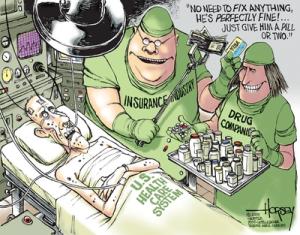- MENU
- HOME
- SEARCH
- WORLD
- MAIN
- AFRICA
- ASIA
- BALKANS
- EUROPE
- LATIN AMERICA
- MIDDLE EAST
- United Kingdom
- United States
- Argentina
- Australia
- Austria
- Benelux
- Brazil
- Canada
- China
- France
- Germany
- Greece
- Hungary
- India
- Indonesia
- Ireland
- Israel
- Italy
- Japan
- Korea
- Mexico
- New Zealand
- Pakistan
- Philippines
- Poland
- Russia
- South Africa
- Spain
- Taiwan
- Turkey
- USA
- BUSINESS
- WEALTH
- STOCKS
- TECH
- HEALTH
- LIFESTYLE
- ENTERTAINMENT
- SPORTS
- RSS
- iHaveNet.com: Politics
by Bernadine Healy M.D.

© David Horsey
As President Obama has it, the nations's sick house is putting us into the poorhouse, and medicine seems not too far behind Wall Street in bringing on our economic woes.
Thus, with a few swoops of the presidential pen, Obama has laid the groundwork for a massive overhaul of America's healthcare system into a more publicly managed, cost-conscious enterprise that focuses more on wellness than sickness.
Driving most government outlays, however, are the many millions of Americans, particularly the elderly, with extremely resource-intensive chronic diseases.
So far, no pain
The reform process meant to reduce the nation's $2.2 trillion yearly healthcare spending currently has many belts expanding, not tightening. Billions are being poured into the proposed pillars of health reform -- a national electronic medical record for all and comparative-effectiveness research programs that will guide more standardized and coordinated care. Some are skeptical that these will cut costs, but the jury's still out.
What's tried and true, however, is the government's power to restrict reimbursement and change medical behavior.
Medicare, which covers virtually all of the elderly, can say "No" to expensive treatments. That's great if the care is unnecessary. But you can't always tell if you're not at the bedside.
A classic example of this carrot-and-stick approach is the one Obama singled out in his budget.
To reduce the rate of costly readmission to the hospital after discharge among the elderly, he laid out a plan to limit Medicare reimbursements if patients are back within 30 days, thereby saving $26 billion of "wasted money" over 10 years. No doubt, too much hospital is bad for anyone, and that has led doctors to find better ways to control disease flare-ups.
But while some analysts see readmission as a gaming of the system, with patients kicked out of the hospital prematurely only to be readmitted when their payment-clock restarts, I'd suggest the major reason is not so venal: The elderly are living longer with serious infirmities.
Earlier this month, researchers analyzed the cases of more than 2 million Medicare patients who were readmitted to the hospital.
What's sobering about their findings is that the patients are really, really sick. In fact, 90 percent of the readmissions in the first 30 days were emergencies. Top causes: heart failure, emphysema, pneumonia, and psychotic breakdowns.
Flare-ups of the same or similarly grave conditions brought them back.
For example, readmission of patients previously admitted for heart failure were triggered by another bout of heart failure or a heart attack, cardiac arrhythmia, or kidney failure.
Cruel fate.
A sudden struggle for breath in someone with serious heart or lung disease can mean an acute deterioration that, left unattended, would lead to an imminent and needlessly cruel demise.
It's a call that can be made only by the medical team caring for the patient. Checking the chart to see if the patient has been hospitalized for the same problem recently is routine; such an event indicates a more intractable condition and might even encourage readmission. If that chart check instead results in a decision not to readmit, because of fears of financial penalties or bad performance marks, we've created an ethical monster.
Automatically assuming that readmissions indicate poor hospital care is flawed, studies show. And trying to pin them on a disconnected delivery system doesn't work, either.
Other countries, most with coordinated, single-payer, socialized medical systems, from Canada to Great Britain, Switzerland to Australia, are struggling as much as if not more than we are with a steady rise in hospital readmissions.
What healthcare reformers may be fighting here is the formidable nature of disease itself and the fact that decades of medical advances have bettered the prospects of the sick and elderly.
If doctors and hospitals stop readmitting these patients, what happens to them?
One suggestion that's knocked around, which sounds ghoulish the more you think about it, flicks at a better use of palliative care. But palliative or hospice care is not for those who are treatable.
In fact, 93 percent of those 2 million Medicare readmits were alive a year later -- despite, or probably because of, having had two or more hospital admissions in the course of that year.
So, before we start counting the savings, imagine what these treatment penalties might mean for your mom or dad, or grandma or gramps.
They all started paying into Medicare when they were young and robust so it would be there for them when they grew old and sick.
Do we change their social contract?
AMERICAN POLITICS
WORLD | AFRICA | ASIA | EUROPE | LATIN AMERICA | MIDDLE EAST | UNITED STATES | ECONOMICS | EDUCATION | ENVIRONMENT | FOREIGN POLICY | POLITICS
Receive our political analysis by email by subscribing here
© Tribune Media Services